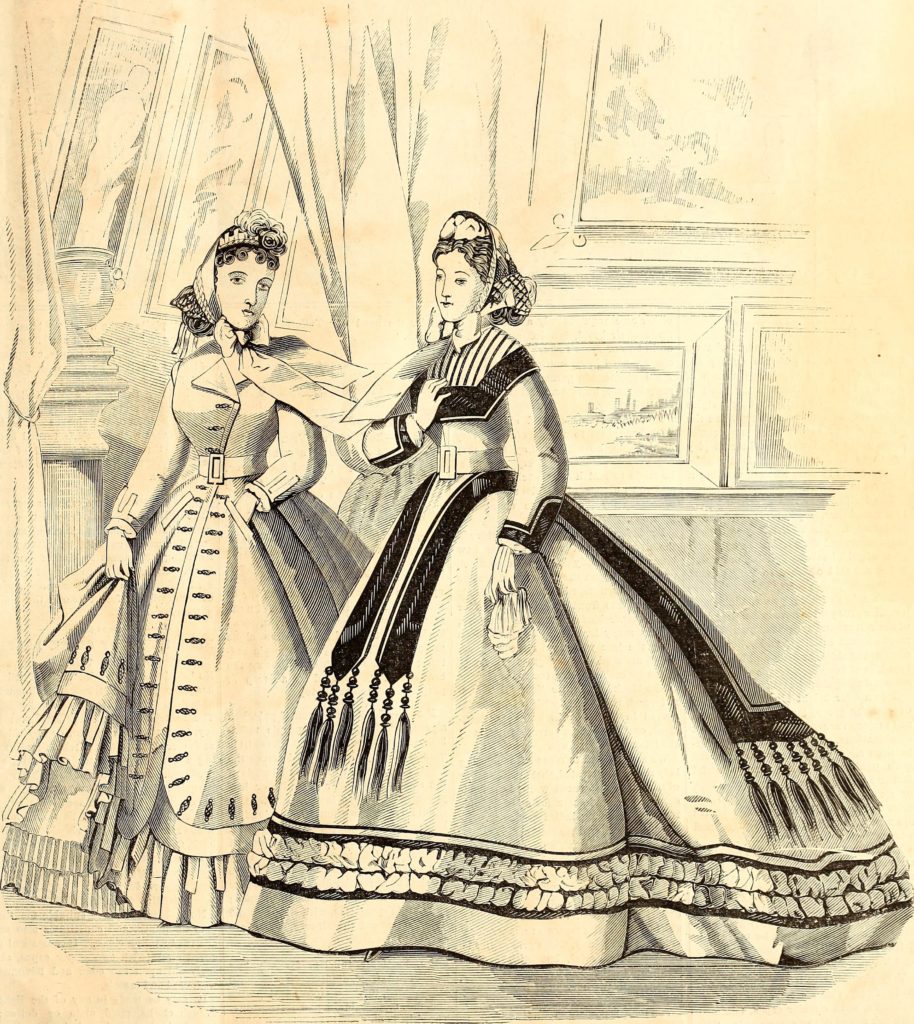
Walking and Carriage Dresses, from Mme. Demorest’s Mirror of Fashions, April 1865
Ellen (Curtis) Demorest was born in New York in 1824. Since her father owned a hat factory, Ellen naturally found her way to a career in the fashion industry. At the age of 18, she set up her own hat shop in Saratoga Springs, New York. Eventually she moved the shop to Brooklyn. At age 34, she married a widower and they set up a retail clothing store in Philadelphia.
Ellen and her sister Kate saw a market demand for simplifying dress making. When they saw Ellen’s African American maid using butcher paper to make a dress pattern, they came up with an idea. They began to create dress designs of fashionable garments using low-cost tissue paper. The problem was that the patterns were specific to the size of the person. Ellen’s sister and husband developed a mathematical formula that would allow one pattern to be used for any size. The family relocated to New York and published a magazine to showcase the various styles on offer.
The patterns that Ellen developed were from the latest fashions. Since the patterns were inexpensive, Ellen’s innovation meant that women across America could wear the latest fashions by sewing their own clothes. This had a democratizing effect for American women. No matter their socio-economic status, women could wear some of the latest fashions. Ellen became known as “Madame Demorest” and established herself as a fashion maven for American women of modest means.
Ellen was an abolitionist and an advocate for women’s rights. The Demorests were also progressive in their hiring and business practices. They hired African Americans to work in an integrated workplace. White employees who objected to working alongside African Americans were let go. If customers didn’t like the politics of the shop, it was suggested they shop elsewhere.
Ellen and her husband never patented their designs. It didn’t take long for others to copy their designs as their own. The Demorest’s decided to sell their business. They used the money from selling their business to support a number of social causes they believed in. These included equal rights for women, abolition of slavery, increasing rights for women and people of color, and alcohol prohibition.
We don’t often think of the roots of democracy in such common things as a dress pattern. But just imagine what Madame Demorest’s dress patterns did for women across America. It lifted them up by giving them access to clothing long denied to them. It helped reduce the social-economic divides. Democracy will struggle when society is divided. In its own small way, the ability of women to fashion themselves with dresses that were once only available to the wealthy helped to reduce the divisions in society.
The fact that the Demorests used the financial gain from selling their business to support social justice causes made their efforts even more crucial to the support of democracy. Just imagine what small steps we can take to overcome the role of hierarchies and divisions in our society. Just imagine what each of us could do to lift up the life of others. Isn’t that the real trait of what it takes to be a democratic citizen?
* * *
“We rise by lifting others.” – Unknown
This is part of our “Just Imagine” series of occasional posts, inviting you to join us in imagining positive possibilities for a citizen-centered democracy.



